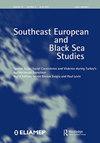争论,但不是欧洲怀疑主义:经济和安全问题,以及对格鲁吉亚失去民族传统的恐惧
IF 0.8
2区 社会学
Q2 AREA STUDIES
引用次数: 0
摘要
摘要本文考察了功利主义、政治和文化/身份为基础的欧洲怀疑主义因素在格鲁吉亚全国代表性样本中的作用。分层多元逻辑回归显示,对于格鲁吉亚人来说,功利主义因素是支持欧盟一体化的最强预测因素,其次是文化/认同和政治变量,支持理性选择理论。反过来,这些预测出现在格鲁吉亚民众对欧盟的普遍看法之前。调解分析显示,将欧盟视为和平与安全之源的看法先于希望在其支持下增加国家安全(政治预测器)。同样,欧盟作为经济发展捍卫者的形象先于格鲁吉亚减少贫困的希望(功利主义预测者)。另一方面,将欧盟视为对民族传统的威胁并不预示着欧洲怀疑主义。我们通过审查格鲁吉亚目前的政治气氛来详细说明这一结果,在那里我们确定,对失去民族传统的恐惧被对经济和政治不安全的恐惧所压倒。关键词:欧洲怀疑主义、多元主义、政治和文化/基于身份的预测者、理性选择理论、对欧盟披露声明的看法、作者未报告潜在的利益冲突。地理位置信息这项研究是在佐治亚州进行的。新的司法特派员于2023年当选。作者简介:ino Javakhishvili是伊莱亚州立大学艺术与科学学院的心理学教授,也是D. Uznadze心理学研究所的主任。她的研究和教学重点是群体间关系、身份形成和性别平等等。Nino ButsashviliNino Butsashvili是伊莱亚州立大学艺术与科学学院的博士候选人,也是D. Uznadze心理学研究所的研究助理。她参与了几个研究项目,包括关注群体间关系和身份形成的研究。本文章由计算机程序翻译,如有差异,请以英文原文为准。
Contestation but not Euroscepticism: economic and security concerns and the fear of losing national traditions in Georgia
ABSTRACTThis paper examines the role of utilitarian, political, and cultural/identity-based factors of Euroscepticism on a nationwide representative sample of ethnic Georgians. Hierarchical multiple logistic regression showed that for ethnic Georgians, utilitarian factors are the strongest predictors of support for the EU integration, followed by cultural/identity and political variables, supporting the rational choice theory. These predictors are, in turn, anteceded by popular perceptions of the EU in Georgia. Mediation analysis revealed that the perception of the EU as a source of peace and security precedes the hope for an increase in national security with its support (political predictor). Likewise, the perception of the EU as a champion of economic development antecedes the hope for reduced poverty in Georgia (utilitarian predictor). On the other hand, the perception of the EU as a threat to national traditions does not predict Euroscepticism. We elaborate on this result through an examination of the current political atmosphere of Georgia, where we determine that fears of losing national traditions are outweighed by fears of economic and political insecurity.KEYWORDS: Euroscepticismutilitarian, political and cultural/identity-based predictorsrational choice theoryperceptions of the EU Disclosure statementNo potential conflict of interest was reported by the author(s).Geolocation informationThe study was conducted in Georgia.Notes1. A new ombudsman was elected in 2023.Additional informationNotes on contributorsNino JavakhishviliNino Javakhishvili is a full professor of psychology at the School of Arts and Sciences and director of D. Uznadze Institute of Psychology at Ilia State University. She is widely published locally and internationally and her research and teaching focus are intergroup relations, identity formation and gender equality, among others.Nino ButsashviliNino Butsashvili is a PhD candidate at School of Arts and Sciences and a research assistant at D. Uznadze Institute of Psychology at Ilia State University. She is involved in several research projects, including studies which focus on intergroup relations and identity formations.
求助全文
通过发布文献求助,成功后即可免费获取论文全文。
去求助
来源期刊

Southeast European and Black Sea Studies
AREA STUDIES-
CiteScore
3.00
自引率
19.00%
发文量
73
期刊介绍:
The aim of the journal is to establish a line of communication with these regions of Europe. Previously isolated from the European mainstream, the Balkan and Black Sea regions are in need of serious comparative study as are the individual countries, no longer "at the edge" of Europe. The principal disciplines covered by the journal are politics, political economy, international relations and modern history; other disciplinary approaches are accepted as appropriate. The journal will take both an academic and also a more practical policy-oriented approach and hopes to compensate for the serious information deficit on the countries under consideration.
 求助内容:
求助内容: 应助结果提醒方式:
应助结果提醒方式:


